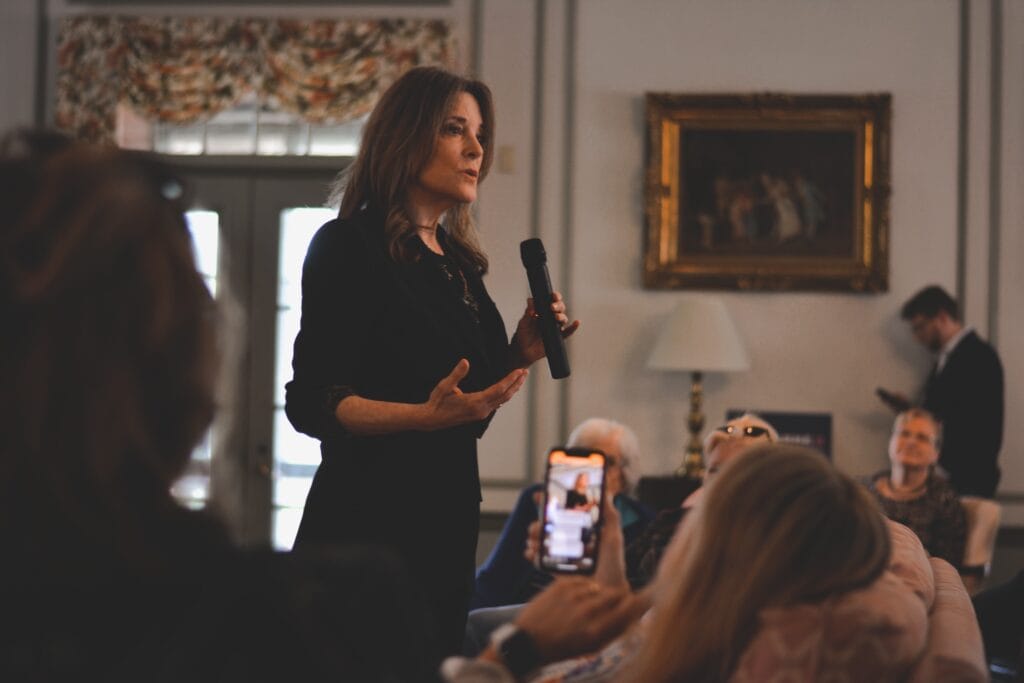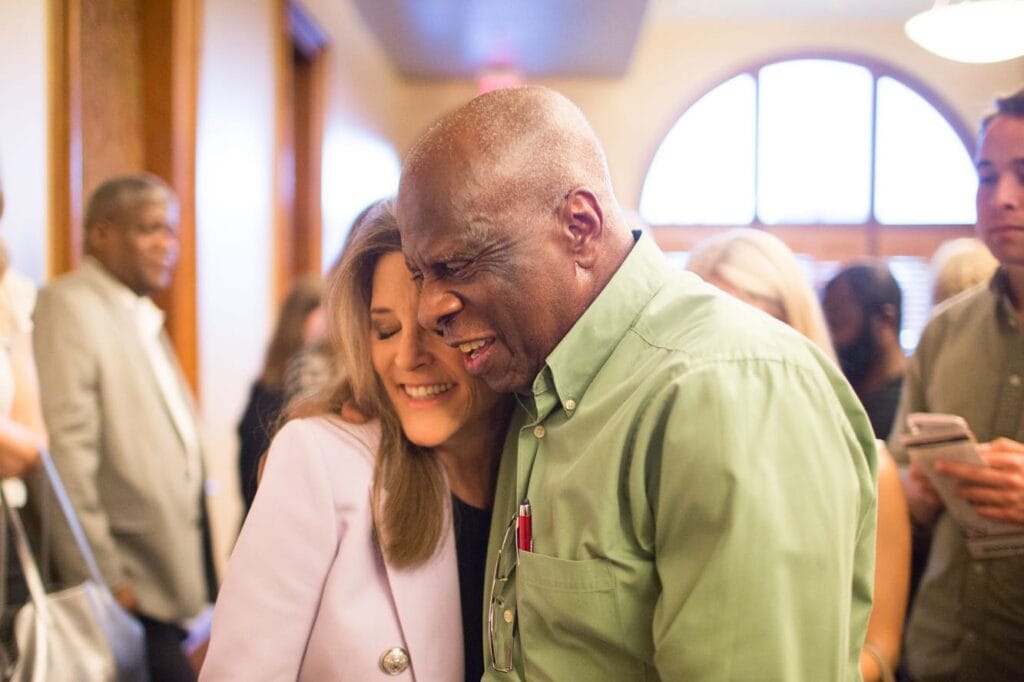About
Why I'm Running
What I saw about twenty years ago is that misery among people seemed more prevalent than it had been before. I was used to confronting the tragedies that can fall upon even the happiest, most privileged lives. But I began to meet way too many people whose suffering seemed to me unnecessary. People who worked hard to live meaningful and productive lives seemed pinned down by social and economic conditions over which they had no control. In too many cases their problems were man-made, and not by them!
Something had fundamentally changed in America.
When I was a young woman in the 1970s an average American worker could afford a house, a car, a yearly vacation, and to send their kids to college. One parent could afford to stay home with the kids if they desired. Economic anxiety simply wasn’t the norm as it is now.
Why? Because during the last fifty years the system has been rigged.
According to the Rand Corporation, over $50 trillion has been redistributed from the bottom 90 percent of Americans to the top one percent over the last 48 years. The average working American now makes, in real dollars, less money for the same work, while CEOs and stockholders have grown enormously rich from a system that increasingly exploits both people and planet. Trickle-down economics has not lifted all boats, as its propagandists promised; it has sunk millions of them, leaving many without even a life vest. An aberrational chapter of American history – in which neoliberal economic philosophy has replaced democracy with short term corporate profits as America’s new bottom line – has thrown our country into a period of social, political and economic decline.
From tax cuts for the wealthy to endless corporate subsidies to the privatization of almost everything; from union busting to obsessive deregulation to a decrease in public spending – economic opportunities had been stripped from America’s average worker. Traveling through America, I saw with my own eyes how chronic economic anxiety has produced an ocean of despair in what used to be America’s middle class.
500,000 people each year going into medical debt; 68,000 Americans dying each year from lack of medical care; 85 million Americans uninsured or underinsured; 18 million Americans unable to afford the prescriptions given to them by their doctors; 64 percent of Americans living paycheck to paycheck; 60 percent of Americans unable to absorb an unexpected $400 expenditure; 88 billion dollars of credit card debt; 600,000 people homeless – such are not just numbers. They are human lives in despair.
Out of that despair has grown all manner of personal and societal dysfunction, from mental health crises to drug and alcohol addiction, increased suicide rates, rampant senseless violence, and people being ideologically captured by genuinely psychotic forces that eat at the very heart of our society.
The Presidency is not merely an administrative office. That’s the least of it…It is pre-eminently a place of moral leadership.
- Franklin D. Roosevelt, 1932 Tweet
Yes, I could pray with people that their situations would improve. Yes, I could work with them to enlighten their mindset; I could teach them skills of endurance and personal transformation. I could work with non-profit organizations that provided charitable support. But something deeper had gone wrong here, some entrenched societal injustice for which no amount of personal charity could compensate and which no amount of prayer could permanently assuage. God cannot do for us what He cannot do through us. It is time for us to act. America has become a fundamentally two-tier society, an economically unjust system, with those who already have a lot enjoying ever increasing ways of making more, while the majority of Americans are struggling to hang on. Once you see that it’s difficult to unsee.
I’ve seen it in parents who did everything they could to do the right thing yet could barely afford their rent or feed their families. I’ve seen it in marriages that were breaking under the stress of the ridiculous hours both partners had to work. I’ve seen it in the despair of children whose schools could only give them too little of what they need. I’ve seen it in the eyes of young people who don’t really see a future for themselves, much less for any children they might have, in America’s current economy or our planetary environment.
Years ago, a young man told me about a story that his father, a Protestant theologian, had written. To me it describes the journey of the Good Samaritan to a Conscious Samaritan. The Good Samaritan is walking down the road and sees a beggar; he gives the beggar alms. The Good Samaritan walks further down the road and sees another beggar; he gives the beggar alms. The Good Samaritan walks further down the road and sees another beggar; he gives the beggar alms.
At a certain point, the Good Samaritan asks himself: “Why are there so many beggars?”
And that, to me, is the question of our time. Why are there so many unhoused, so many without health insurance, so many students shackled by college loan debt, a climate crisis underattended to, a raging war machine, extreme income disparity, mental health and addiction crises, children in schools that don’t even have working toilets or adequate resources to teach kids to read, and our democracy itself under attack from everything from voter suppression and election denial to the plutocratic financial influence of corporations and billionaires on a government that has become in too many ways a system of legalized bribery?
The dirty secret in America today is that our government doesn’t even spend a lot of time trying to answer those questions. The system as it now exists puts short-term corporate profits before the safety, health and well-being of people, animals, and planet. With millions of Americans falling deeper and deeper underwater economically, anyone in political office who either doesn’t care to fix that – or doesn’t have the spine to fix it – doesn’t deserve to be running this country.
Washington DC is filled with political car mechanics, but the problem is that we’re driving on the wrong road. This country doesn’t need more technicians; it needs a vision. And those whose careers have been entrenched in a system that drove us into a ditch are hardly the ones we should consider uniquely qualified to lead us out of it. An entrenched political class is the problem, it is not the answer.
We are not living in easy times, but the times will change when We the People are willing to change them. I feel my forty years being up close and personal with the trauma of so many thousands of individuals gives me a unique perspective on what is needed to help America begin again. Our campaign exists to help harness the political voices of millions of people throughout this country already forming a chorus of change. We are ready to disrupt the corruption that has led to such a dangerous place for both people and planet, and put America on the path to a season of repair.


How My Career Began
Forty years ago, I began giving lectures in Los Angeles on a set of books called A Course in Miracles. The Course isn’t a religion, but a self-study program of spiritual psychotherapy based on universal spiritual themes. I was fascinated by the book and was thrilled to be giving talks about it to other interested readers.
A year or so after I began giving lectures, something terrible happened. The AIDS crisis became a full-blown catastrophic epidemic, and if you were living in cities like Los Angeles it was all around you. The medical community worked overtime trying to find a cure, a treatment – anything! For most people who contracted HIV during its early years, death was almost a certainty. Young, vibrant, talented, extraordinary people all around us were struck down in horrible ways and in staggering numbers.
The despair was palpable, and a general homophobic prejudice throughout the culture contributed to the suffering. I knew young men who were more afraid to tell their parents they were gay than to tell them they were dying.
During that time, many gay men in Los Angeles, then later in New York, began coming to my lectures. They learned about a God who loves us no matter what, and how the practice of forgiveness can lead to inner peace. My lectures became a place where a grieving and traumatized population could come for solace, community, and prayer.
As my lectures grew, we added support groups during the week for those who were ill. I started non-profit organizations in both LA and NY that provided non-medical services for people dealing with life-threatening illnesses – everything from free support groups to meditation classes to free meals. Our task was simple. We couldn’t control whether someone was sick, but we could control whether they were alone and whether they were loved. Project Angel Food, which we began in order to serve free meals to homebound people with AIDS, has now served over 14 million meals to homebound and critically ill patients in the Los Angeles area.
The Legacy of Marianne Williamson and The Founding Team of Project Angel Food, Directed by Marc Saltarelli
During that time, I also began writing. In 1992 I published my first book, A RETURN TO LOVE: Reflections on the Principles of A Course in Miracles. The book became an instant bestseller, and ultimately the fifth largest selling book in America that year. I have written 15 other books since.
Who I Am
I’ve had a good career. I have traveled giving classes and lectures not only throughout America but also internationally. While the majority of my books are based on non-denominational spiritual themes, two of them – Healing the Soul of America and A Politics of Love – extend my spiritual inquiry into political matters. As my writing career continued, so did my non-profit advocacy on issues such as AIDS care, peace, hunger, and racial reconciliation.
Traveling as much as I have and dealing with many thousands of people, I’ve had a front row seat to many things. I saw that about twenty years ago, America began to change. I realize now that the seeds of that change were planted twenty years before, but it was in the late 1990’s and early 2000’s that we began to see the fundamental shift in the way Americans lived and worked.
For the first twenty years of my career, I worked with a great number of people whose lives had hit a rough spot. I was up close and personal with people in some of their toughest hours, from having just gotten a terrible diagnosis, to learning their child was addicted to heroin, to learning their spouse had left unexpectedly, to learning that their career was abruptly ended, and so forth. I tried not only to provide comfort, but also inspiration and information to help people heal and transform their lives.